The benefits and harms of grape juice, preparation and use
Grape juice retains the healing properties of berries, contains minerals, fiber, vitamins, antioxidants, protein, glucose. It is used not only to quench thirst, but also as a remedy for the treatment and prevention of certain diseases. The benefits and harms of grape juice depend on a number of factors: varieties, compatibility with other products, freshness, naturalness and consumption volumes.
The content of the article
Composition and nutritional value of grape juice
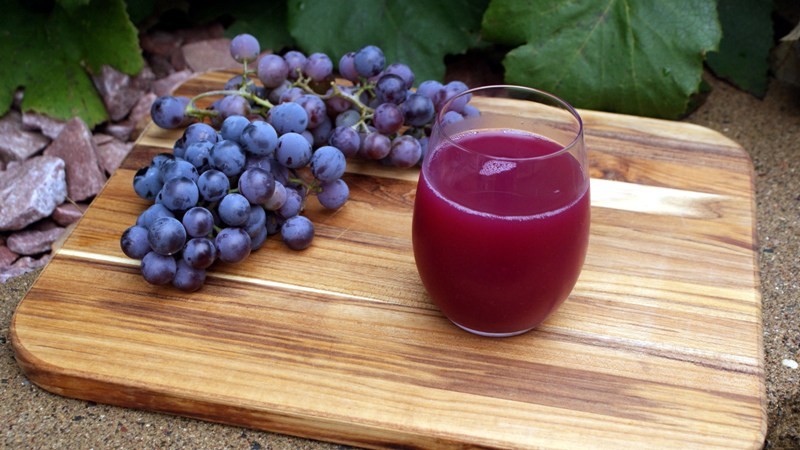
Depending on the grape variety and the climatic conditions of its growth, the taste and content of nutrients varies. This drink contains:
- organic acids;
- alimentary fiber;
- amino acids - alanine, aspartic, glutamic, lysine, valine, serine, tryptophan;
- water;
- glucose, fructose and sucrose;
- B vitamins: B1, B2, B3, B5, B6, B9;
- vitamins C, E, H, PP;
- trace elements - iron, iodine, manganese, cobalt, copper, fluorine, chromium, molybdenum, zinc;
- macroelements - potassium, calcium, sodium, magnesium, phosphorus, chlorine.
All of the above active biological components can be found exclusively in freshly prepared grape juice. A store-bought drink contains a lot of sugar, preservatives, colors, sweeteners and flavorings, which makes it unhealthy and even dangerous.
Nutritional value per 100 g of product:
- calorie content - 70 kcal;
- proteins - 0.3 g;
- fats - 0.2 g;
- carbohydrates - 16.3 g;
- dietary fiber - 0.3 g
Effect on the human body
The juice obtained from fresh grapes effectively supplies tissues and cells with nutrients in a form available for assimilation. It contains proteins, vitamins, minerals, organic acids and other elements that ensure the active life of the body.
Grape juice has not only nutritional, but also dietary and medicinal properties. Its regular use has a beneficial effect on the condition and functions of organs and systems, strengthens health, prolongs life, and serves as the prevention of various diseases.
Important! The ideal time to consume grape juice with benefits for the body is the autumn period. This is the ripening time for the berries. In winter and early spring, grapes that are marketed are processed to increase shelf life, so large quantities can be hazardous to health.
Benefit

Components of grape juice have a beneficial effect on organs and systems:
- Digestive system... It absorbs fats and toxic substances, removes them outside, accelerates lipolysis, helps to cope with constipation, improves digestion, and regulates metabolism.
- Nervous system... B vitamins have a positive effect on brain activity, improve memory and concentration, stimulate thinking processes, reduce the level of sensitivity to external stimuli, reduce stress manifestations, and normalize night sleep.
- The cardiovascular system. The juice neutralizes the damaging effect of free radicals on cells and tissues, lowers the level of bad cholesterol and glucose in the blood, increases the strength and elasticity of the vascular walls, activates blood flow and lymph flow, improves the nutrition of the heart muscle and maintains its functionality.
- Urinary system. Possessing choleretic and diuretic properties, grape juice gently removes excess fluid from the body, neutralizes puffiness, activates the outflow of bile, and prevents the formation of stones in the gallbladder.
- Musculoskeletal system. The drink reduces the concentration of uric acid in the joints, inhibits degenerative changes in cartilage, stimulates collagen production, prevents osteoporosis, provides adequate bone mineralization, has anti-inflammatory and analgesic properties for osteochondrosis, arthritis, arthrosis.
Grape juice is an excellent vitamin remedy, especially in the autumn-winter period. The active components of the composition stimulate the immune system, protect against infections, increase the body's resistance to viruses and bacteria.
In addition, grapes:
- adapts the body to stressful conditions;
- reduces inflammatory reactions;
- improves intestinal barrier functions;
- inhibits oxidative processes.
By consuming juice from grape berries, you can control weight, get rid of extra centimeters at the waist and hips. Due to the high sugar content in berries, it is consumed in limited quantities, combined with low-calorie foods.
How does weight loss occur:
- Fiber cleanses the digestive tract of toxins and toxins, stimulates intestinal peristalsis, improves digestion.
- Complex carbohydrates provide fast and long-lasting satiety without overloading the digestive system. They are digested and assimilated easily and quickly (in 15-20 minutes, while fresh berries - in 3-5 hours), and energy resources are used to restore and nourish tissues, organs, glands.
- Dietary fiber increases endurance and performance.
- Polyphenols regulate lipid metabolism, remove excess fluid from the body, relieve edema.
- Organic acids activate the process of lipolysis, normalize the intestinal microflora, and prevent the development of dysbiosis.
Light and dark colored varieties contain a different set of substances, so it is recommended to alternate them.
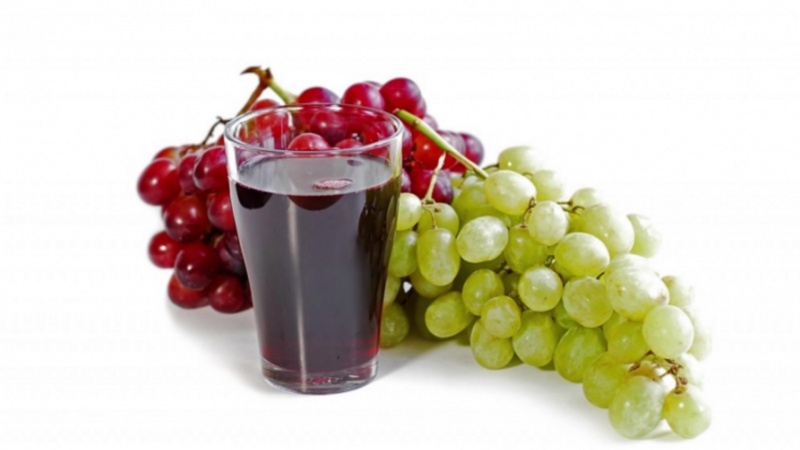
Contraindications and possible harm
There are a number of contraindications for drinking grape juice:
- allergy to the product;
- peptic ulcer of the stomach or duodenum;
- increased acidity of gastric juice;
- pancreatitis;
- severe liver and pancreas pathologies;
- severe renal failure;
- diabetes mellitus type 2 and 3;
- intolerance to fructose, glucose;
- obesity 3-4 degrees.
In order not to harm health, before using grape juice for medicinal or prophylactic purposes, it is advisable to consult with a specialist, exclude possible contraindications, and determine the optimal application regimen.
Adverse reactions are associated with prolonged and abundant drinking a drink. Grape juice in large quantities in the presence of diseases of the digestive system can worsen the general well-being, intensify the symptoms of the disease, provoke colic, painful sensations, bloating, diarrhea.
With individual intolerance to grapes, there is a high probability of developing an allergic reaction, which is manifested by itching, peeling, reddening of the skin, hives, tissue edema.
Organic substances and amino acids from grape berries, getting on carious teeth, destroy tooth enamel.
Council. To protect your teeth, it is recommended to drink the juice through a cocktail tube and rinse your mouth with a soda solution after each intake (1 teaspoon of soda per 250 ml of water at room temperature).
Incorrect combination of grape juice (eg milk, fish, fatty foods, cucumbers) causes indigestion. The condition is accompanied by nausea, vomiting, heartburn, soreness in the upper abdomen or around the navel.
Nursing and pregnant women should drink juice with caution.During the period of gestation, abundant drinking of the drink can cause rapid weight gain, which is highly undesirable, especially in the later stages. Nutritionists recommend limiting yourself to 200 ml of freshly prepared fresh juice per day. During breastfeeding, juice from grape berries can cause increased gas production in an infant.
How to make juice
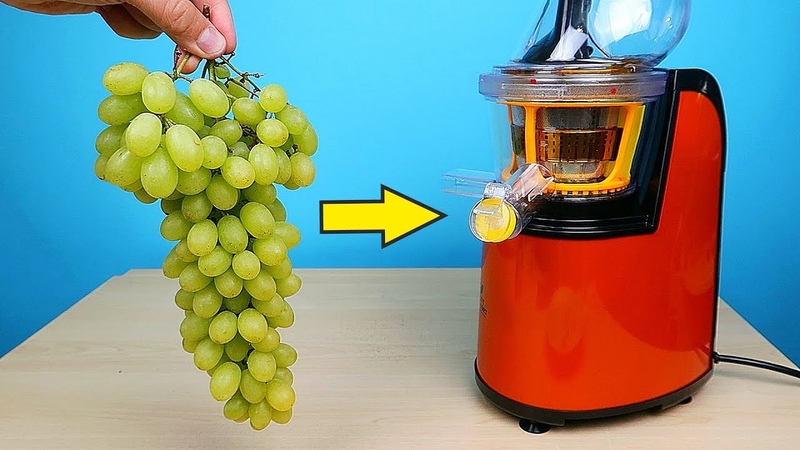
Making grape juice at home is not difficult. Ripe berries are chosen, since organic acids in fruits that have not reached ripeness have an irritating effect on the gastrointestinal mucosa. The ideal option is grapes of our own harvest, grown without the use of pesticides in safe conditions.
To obtain a small amount of juice, use a juicer, food processor, meat grinder, blender. A hand press is used for large volumes.
How to make grape juice:
- Peel the berries from the stalks, remove spoiled fruits and debris, rinse.
- Remove any remaining moisture with a paper towel or transfer to a colander to drain the water.
- Prepare juice using any of the listed kitchen appliances.
The drink obtained from the electric juicer is immediately eaten. In other cases, the juice from the grape gruel is filtered using a sieve or gauze folded in several layers.
They drink juice immediately after preparation, as storage leads to oxidation and loss of useful properties. To preserve the juice from grape berries, it is subjected to heat treatment: it is poured into sterilized glass jars, and canned. At a temperature of + 5 ° C, the drink is stored for 12 months.
Alternative uses of grape juice
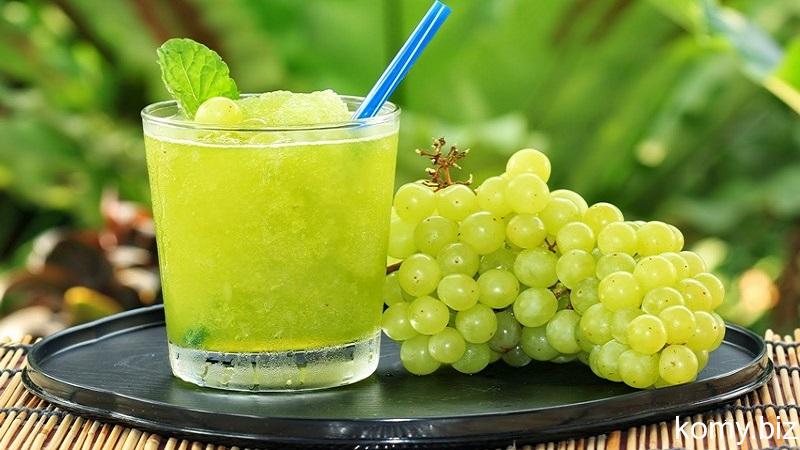
Nourishing grape juice quenches thirst and provides fast, long-lasting satiety. In addition, it has pronounced medicinal properties.
For reference... There is a separate direction in medicine - ampelotherapy. This is a treatment with grapes and grape juice for acute and chronic diseases. It is carried out in combination with diet and climatotherapy.
Use in traditional medicine
Grape juice is not a panacea for all diseases. However, using it regularly, you can influence the course of some pathologies, speed up the healing process, and alleviate the severity of symptoms. It is also a remedy for the prevention of diseases of the heart, blood vessels, kidneys, nervous system, obesity:
- Anemia. Freshly prepared fresh juice is recommended as an additional source of iron and vitamin C, which promotes the absorption of iron and strengthens the immune system. Folic acid in berries restores the processes of absorption of substances in the intestines.
- Neurotic disorders. B vitamins ensure the functioning of the central and peripheral nervous system, increase stress resistance, relieve feelings of fear and anxiety, eliminate irritability, and normalize sleep.
- Gout. Possessing choleretic and diuretic properties, the drink reduces the concentration of uric acid salts. Organic acids contribute to their dissolution, preventing the formation of salt calculi. Berries inhibit inflammation, reduce pain, and restore physical activity.
- Metabolic disease. With moderate consumption, the juice does not provoke increased insulin production, normalizes blood glucose levels, improves digestion, supports the functions of the gastrointestinal tract, and cleanses the intestines from accumulated harmful substances. In case of diseases of the digestive system, it restores the microflora, enhances the natural immune defense.
- Constipation. Dietary fiber activates the motor function of the colon. The vitamin-mineral complex regulates the water-salt balance, weakens muscle tone, liquefies stool, which facilitates the process of defecation.
- Arterial hypertension... Reduces high blood pressure and keeps them normal, reduces the swelling of the vascular wall and blood flow to the heart, increases urine production.
- Avitaminosis. The drink replenishes the lack of minerals and vitamins, ensures the functioning of all systems and organs, increases endurance and performance.

In cosmetology
Grape juice is a popular cosmetic product. It delicately cares for the skin of the face and neck, serves as an alternative to expensive cosmetics, and is suitable for any skin type and age. Performs several functions at the same time:
- tones up;
- moisturizes;
- slows down the aging process;
- stimulates collagen production, preventing the appearance of early wrinkles;
- accelerates tissue regeneration;
- provides a uniform and healthy complexion;
- protects the skin from the negative effects of sunlight;
- removes the upper stratum corneum;
- reduces excess sebum separation.
Grape juice is used to wipe the face or add as one of the ingredients to homemade masks.
Important! For each skin type, beauticians recommend using certain varieties. Pink berries are suitable for dry and flaky skin, green ones cope with the problems of oily and combination, dark ones - salvation for problem skin with dilated capillaries and rashes.
Grape juice is good for hair and scalp. Essential oils, vitamins, minerals and amino acids nourish and stimulate follicles, dilate blood vessels, which leads to increased blood circulation in this area. The juice solves the problem of oily hair at the roots: it regulates the activity of the sebaceous glands, cleanses the skin, preventing their loss in the future.
If you regularly rinse your hair with juice from grapes, it grows more intensively, becomes strong and healthy. The freshly prepared juice, combined with other products, is used as a mask for dull, thin and weak hair.
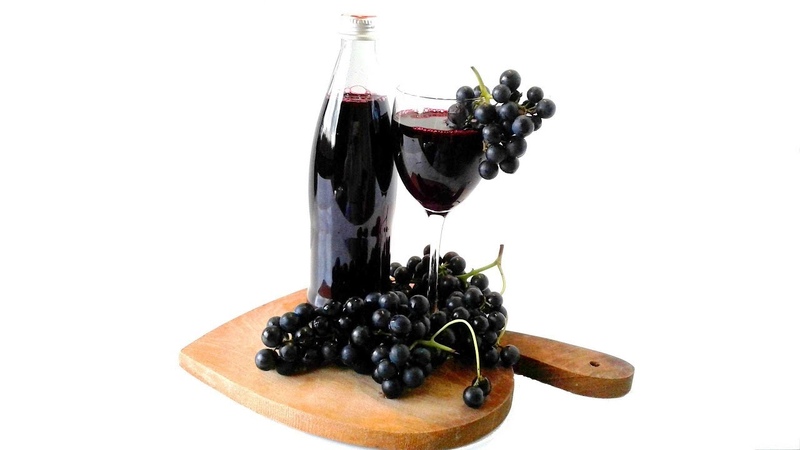
It is interesting:
When and how to properly prune grapes in autumn and care for them after the procedure.
Conclusion
Grape juice has nutritional, dietary and medicinal properties. The active components of the composition support health and prevent diseases. The drink has anti-inflammatory, diuretic, choleretic, analgesic, immunomodulatory, antioxidant effects. However, people with chronic and acute gastrointestinal diseases should first familiarize themselves with the contraindications to the use of this drug.